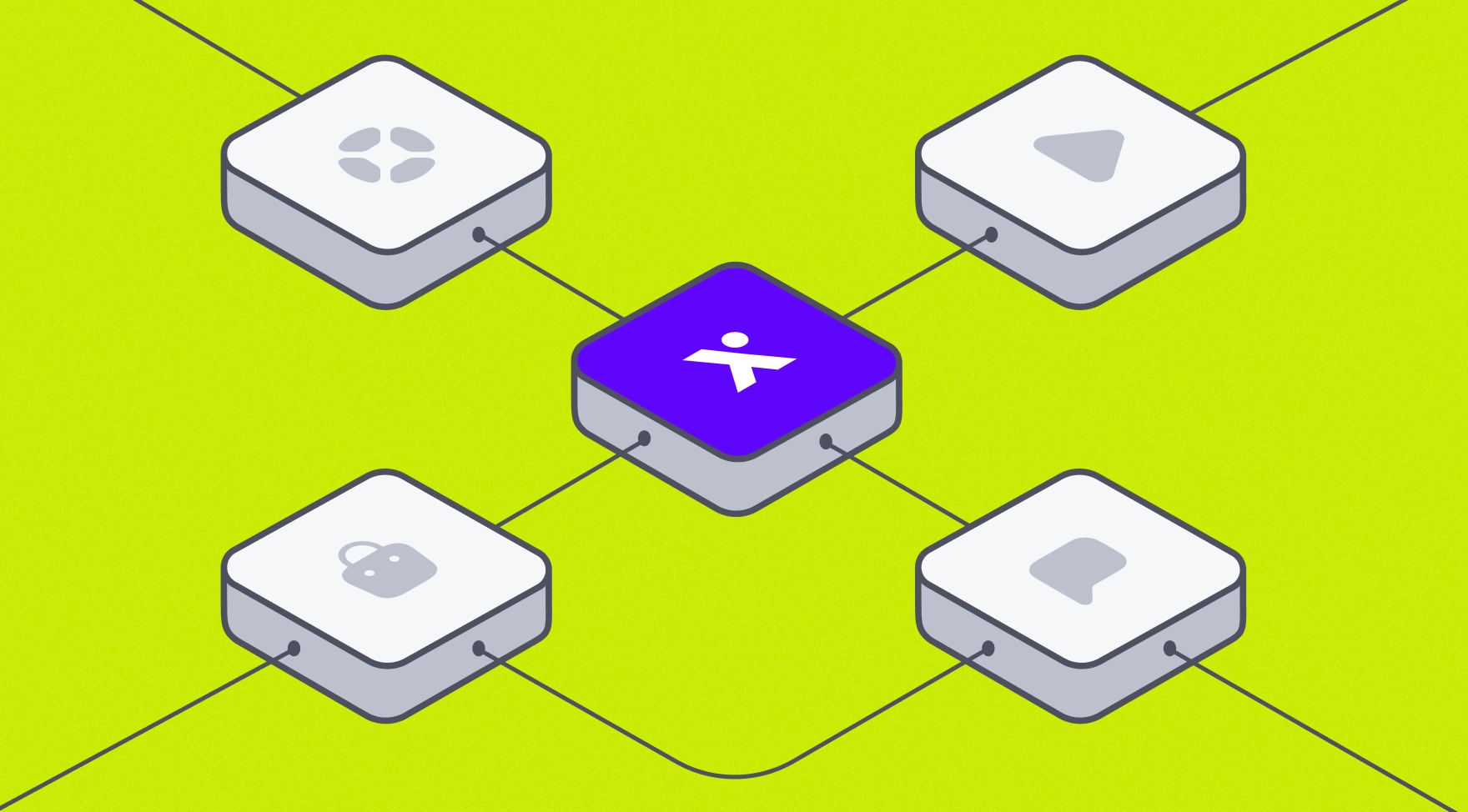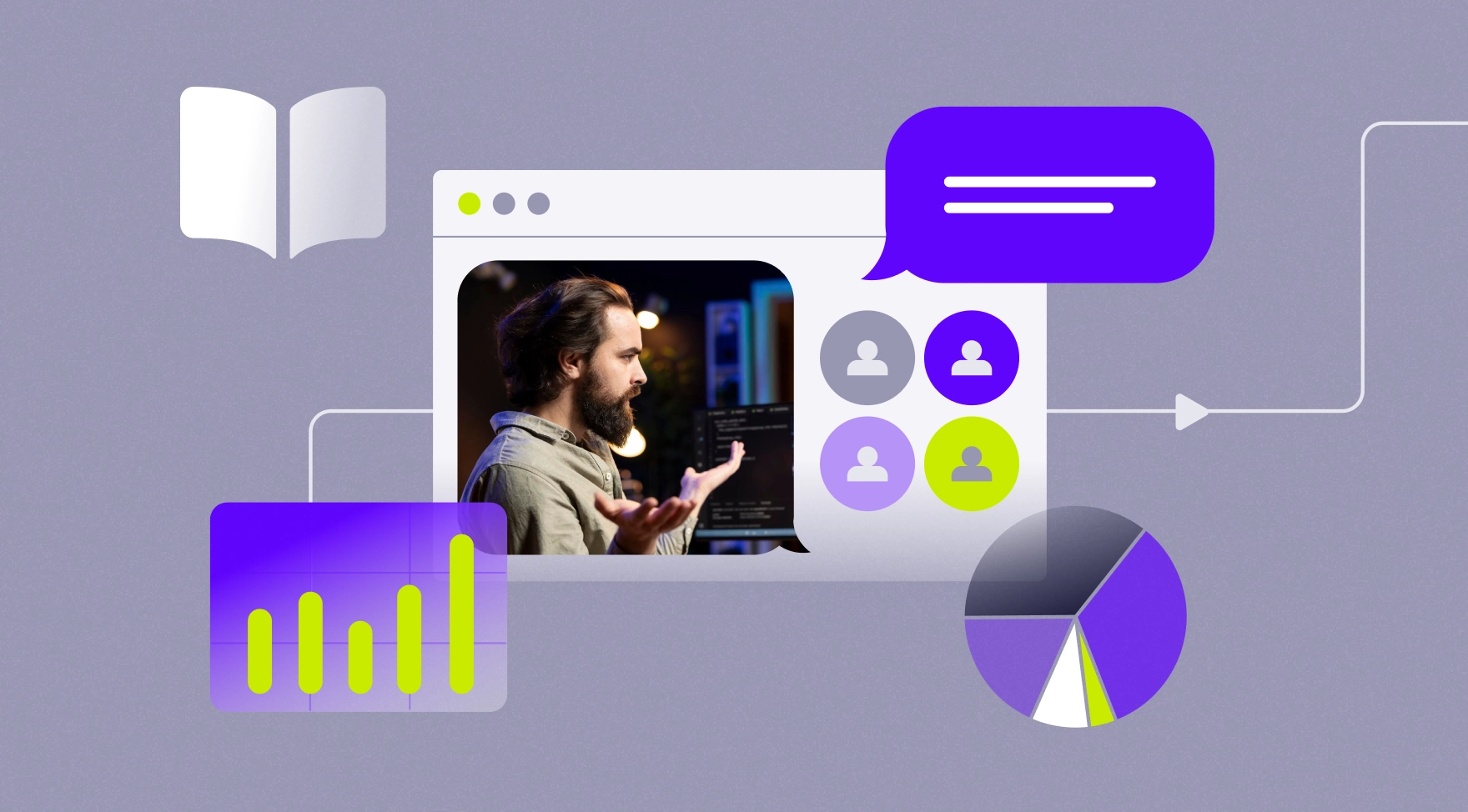Applied LLM: Business areas benefiting from ML + LLM synergy

A powerful combination of Machine Learning and Large Language Models brings a new dimension to handling domain-specific tasks across industries. Discover how businesses use this synergy to transform their operations and how ValueXI can assist.
September 9, 2024
Large Language Models (LLMs) such as GPT and LLaMA are bringing value to businesses by enhancing data analysis, automating tasks, and supporting decision-making. They are increasingly used to upgrade customer interactions, create content, and even assist with coding. When combined with Machine Learning (ML), LLMs bring a new dimension to domain-specific tasks across industries — from financial services to game development. Here’s how different sectors benefit the synergy of ML and LLMs, and how ValueXI can help you utilize these capabilities effectively and securely.
Benefits of integrating ML and LLM
LLMs and Machine Learning work together to elevate the capabilities of Artificial Intelligence systems. ML models excel at analyzing large datasets to identify patterns, make predictions, and uncover insights, optimizing aspects of business operations such as predicting equipment failures or forecasting market trends.
Leveraging their natural language processing capabilities, LLMs complement this by translating complex ML outputs into human-readable and actionable information. They generate detailed reports, summaries, and recommendations based on insights derived from ML, making it easier for users to understand and act on the information. This synergy not only improves decision-making but also enhances communication across teams.
How ML and LLMs bring value:
- Increased accuracy and efficiency: Combining ML for data analysis with LLM for text generation ensures precise and efficient processes.
- Enhanced user interaction: LLMs create clearer, more personalized communications.
- Cost and time reduction: Automating and optimizing processes cuts costs and speeds up tasks.
The application scenarios below show how businesses in different sectors can improve their business processes, increase customer satisfaction, and gain a competitive edge.
ML & LLM fusion’s best scenarios
1. Finance & Insurance
- Risk management and fraud detection: ML models analyze transaction data to spot anomalies and potential fraud. LLMs then assist in explaining these results and generating detailed reports for regulators, enhancing compliance and transparency.
- Customer service automation: LLMs drive chatbots that handle client inquiries, improving response times and service quality while lowering operational costs. ML contributes by analyzing past interactions to refine the chatbot’s understanding and accuracy. Additionally, ML models can predict common customer issues based on historical data for proactive support.
2. Healthcare & Pharmaceutics
- Diagnostic and treatment planning assistance: ML algorithms process medical text and image records to assist with diagnostics. LLMs interpret these findings, providing healthcare professionals with the initial diagnostic insights and treatment suggestions, which enhances accuracy, doctor-patient communication, and speeding up medical assessment.
- Drug development: ML evaluates biological data to predict drug interactions and efficacy. LLMs then generate detailed and accurate research documentation and regulatory submissions. This combination accelerates drug development, reduces time-to-market, and enhances research effectiveness.
3. Legal industry
- Document analysis and automation: ML extracts key information from legal documents, while LLMs draft contracts and summarize legal content, reducing time and minimizing errors.
- Customer consulting and support: ML analyzes legal precedents to extract relevant information, while LLMs use these insights to generate informed responses. This combination aids lawyers in building stronger cases and improving legal outcomes.
4. Retail & E-commerce
- Customer insights and personalization: ML analyzes customer behavior to identify preferences, and LLMs then create personalized recommendations and marketing content, improving the shopping experience, and boosting sales.
- Review analysis: LLMs process customer feedback to highlight trends, while ML models predict future needs and product improvements, driving refinements in products and services.
5. Manufacturing
- Production optimization: ML analyzes production data to identify inefficiencies and predict equipment failures. LLMs provide detailed instructions and reports to address these issues, reducing downtime and improving product quality.
- Supply chain management: ML forecasts demand and optimizes inventory levels, helping to ensure that supply meets demand efficiently. Meanwhile LLMs assist by generating detailed procurement and logistics reports, streamlining communication and coordination across the supply chain.
- Analysis of production documentation: ML analyzes production documents to extract relevant information and identify patterns. LLMs then use this data to generate clear and actionable insights for staff, supporting decision-making and elevating overall operational efficiency.
6. Media and Entertainment
- Content generation: ML analyzes audience preferences to guide content creation, and LLMs generate articles, scripts, and marketing materials, ensuring relevance and quality, allowing creative teams to focus on strategic tasks.
- Audience insights: ML analyzes viewer data to refine content suggestions, while LLMs produce engaging summaries and recommendations, which helps media companies tailor their content more effectively and boosts audience engagement.
7. Telecommunications
- Network optimization and customer support: ML models predict network potential issues and optimize performance, helping prevent downtime and enhance overall network reliability. LLMs automate customer support by generating detailed reports and recommendations for engineers, improving service quality and operational efficiency.
- Marketing campaigns: ML analyzes user data to segment audiences, and LLMs craft personalized marketing messages, improving campaign effectiveness and customer engagement.
8. Real Estate
- Market analysis and forecasting: ML models predict market trends and property values, while LLMs craft detailed reports and recommendations for real estate agents, aiding in crafting effective sales strategies.
- Property management: ML assesses property data for maintenance needs, and LLMs create management reports and recommendations, reducing maintenance costs and improving management quality.
9. Government & Nonprofits
- Data analysis and decision making: LLMs analyze large datasets to identify trends and anomalies, and LLMs generate comprehensive reports and actionable insights, enhancing decision-making and resource management.
- Public service automation: LLMs automate responses to citizen requests, while ML analyzes service data to improve delivery and reduce administrative burden.
10. GameDev
- Game design and development: ML analyzes player behavior to guide game design, and LLMs generate storylines, character descriptions, and dialogue, enhancing player engagement and game quality.
- Player experience enhancement: ML tracks gameplay data to identify issues and trends, and LLMs provide recommendations for improving game mechanics and user experience.
11. IT development
- Code analysis and optimization: ML models identify code errors and optimization opportunities, and LLMs assemble improvement reports and documentation, enhancing code quality and performance.
- Testing and deployment automation: ML automates testing processes and deployment, while LLMs assist in creating test reports and deployment documentation, streamlining development workflows.
- Tech support: LLMs handle common technical queries and issues, while ML monitors and analyzes system data to predict potential problems and optimize support responses, improving overall IT support.
How ValueXI can assist
Monetizing the LLMs involves substantial investment and expertise. Developing AI solutions to optimize processes requires unique data, skilled Data Scientists, and prompt engineers to prepare data, ensure privacy, and integrate new tools seamlessly into your infrastructure.
ValueXI serves as a powerful platform for developing AI models, minimizing development costs and offering control from data upload to model readiness. Our extensive experience in LLMs, prompt engineering, developing AI solutions from scratch, and managing projects from concept to full implementation helps businesses maximize the benefits of LLMs while addressing related challenges.
With ValueXI, you can effectively handle:
- Privacy and data security: We prioritize data protection, offering options to anonymize or secure your data within our platform before processing with LLM, maintaining compliance while leveraging their capabilities.
- Control and transparency: Our tool enhances model interpretability and transparency, helping you manage complex neural networks and address potential errors.
- Data quality: We assist in preparing and validating your data to ensure effective AI training, minimizing issues with incomplete or erroneous data.
- Integration and optimization: Post-development, ValueXI ensures seamless integration of the model into your existing processes, enhancing efficiency and driving improvements. Our platform manages all interactions with LLMs through API integration.
For more information on application scenarios of LLMs and business cases of the ValueXI platform for AI project development, contact us directly at [email protected] or fill the Demo form and we'll get in touch with you within 1 working day.
Accelerate AI services integration X3 fast and X5 cheaper with ValueXI
Request a demoYou may also like

Corporate AI with ready-made pipelines
Discover how ValueXI’s pre-configured AI solutions are automating and optimizing workflows across business units — from Sales and Finance to HR and Support.
January 20, 2025

Why AI is a must-have for leasing companies
Explore how AI can help leasing businesses solve key challenges and why adopting new technologies is essential for success in this sector.
December 19, 2024

Workshops as the first step towards mastering AI
In the complex field of AI, identifying the best approach and securely launching an AI project can often be more challenging than selecting the right tools. To help bridge this gap, we recommend expert-led training sessions that connect theoretical knowledge with practical application, guiding you through the complexities of AI implementation.
November 7, 2024